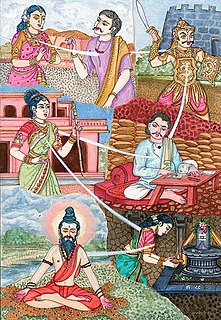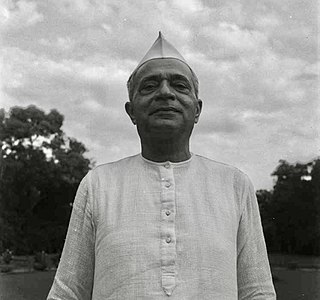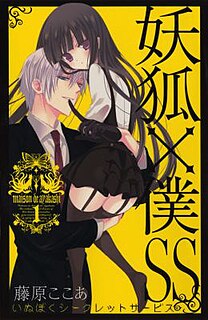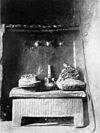Related Research Articles
The afterlife is a purported existence in which the essential part of an individual's identity or their stream of consciousness continues to live after the death of their physical body. According to various ideas about the afterlife, the essential aspect of the individual that lives on after death may be some partial element, or the entire soul or spirit of an individual, which carries with it and may confer personal identity or, on the contrary nirvana. Belief in an afterlife is in contrast to the belief in oblivion after death.

Reincarnation, also known as rebirth or transmigration, is the philosophical or religious concept that the non-physical essence of a living being begins a new life in a different physical form or body after biological death. Resurrection is a similar process hypothesized by some religions, in which a soul comes back to life in the same body. In most beliefs involving reincarnation, the soul is seen as immortal and the only thing that becomes perishable is the body. Upon death, the soul becomes transmigrated into a new infant to live again. The term transmigration means passing of soul from one body to another after death.

The Karmapa is the head of the Karma Kagyu, the largest sub-school of the Kagyu, itself one of the four major schools of Tibetan Buddhism. Karmapa was Tibet's first consciously incarnating lama.

Ọdinani, also Omenala, Omenana, Odinana or Ọmenani, are the traditional cultural beliefs and practices of the Igbo people of south east Nigeria. These terms, as used here in the Igbo language, are synonymous with the traditional Igbo "religious system" which was not considered separate from the social norms of ancient or traditional Igbo societies. Theocratic in nature, spirituality played a huge role in their everyday lives. Although it has largely been supplanted by Christianity, the indigenous belief system remains in strong effect among the rural and village populations of the Igbo, where it has at times influenced the colonial religions. Odinani is a pantheistic and polytheistic faith, having a strong central deity at its head. All things spring from this deity. Although a pantheon of other gods and spirits, these being Ala, Amadiọha, Anyanwụ, Ekwensu, Ikenga, exists in the belief system, as it does in many other Traditional African religions, the lesser deities prevalent in Odinani expressly serve as helpers or elements of Chukwu, the central deity.

The Igbo people are an ethnic group in Nigeria. They are primarily found in Abia, Anambra, Ebonyi, Enugu, and Imo States. A sizable Igbo population is also found in Delta and Rivers States. Large ethnic Igbo populations are found in Cameroon, Gabon, and Equatorial Guinea, as well as outside Africa. There has been much speculation about the origins of the Igbo people, which are largely unknown. Geographically, the Igbo homeland is divided into two unequal sections by the Niger River—an eastern and a western section. The Igbo people are one of the largest ethnic groups in Africa.

A changeling, also historically referred to as an auf or oaf, is a human-like creature found in folklore throughout Europe. A changeling was believed to be a fairy that had been left in place of a human stolen by other fairies.
An ọgbanje is a term in Odinani for what was thought to be an evil spirit that would deliberately plague a family with misfortune. Belief in ọgbanje in Igboland is not as strong as it once was, although there are still some believers.

Hawkman is a superhero appearing in American comic books published by DC Comics. The character, which was created by Gardner Fox and Dennis Neville, first appeared in Flash Comics #1. There are two separate origins of Carter Hall; the Golden Age origin and the Post-Hawkworld origin.

Kisjakabfalva is a village in Baranya county, Hungary. Until the end of World War II, the majority of the inhabitants were Danube Swabians, also called locally as Stifolder, because their ancestors once came in the 17th century and 18th century from Fulda (district). Mostly of the former German settlers were expelled to allied-occupied Germany and allied-occupied Austria in 1945–1948, as a result of the Potsdam Agreement. Only a few Germans of Hungary live there, the majority today are the descendants of Hungarians from the Czechoslovak–Hungarian population exchange. They occpied the houses of the former Danube Swabians inhabitants.
Vaitheeswaran is a 2008 Tamil language film. It starred Sarath Kumar, Meghna Naidu and Pooja Gandhi. The film made a below average impact at the box office.

Mangaldas M. Pakvasa, મંગળદાસ પક્વાસ a freedom fighter and one of the first five Indian Governors, served as the first President of the Bharat Scouts and Guides from 1953 to November 1960.
Reincarnation is the concept that the soul, after biological death, begins a new life in a new body.
Igbo Culture are the customs, practices and traditions of the Igbo people of southeastern Nigeria. It consists of ancient practices as well as new concepts added into the Igbo culture either by cultural evolution or by outside influence. These customs and traditions include the Igbo people's visual art, music and dance forms, as well as their attire, cuisine and language dialects. Because of their various subgroups, the variety of their culture is heightened further.
The Igbo calendar is the traditional calendar system of the Igbo people from present-day Nigeria. The calendar has 13 months in a year (afo), 7 weeks in a month (onwa), and 4 days of Igbo market days in a week (izu) plus an extra day at the end of the year, in the last month. The name of these months was reported by Onwuejeogwu (1981).
The receptorome is a concept analogue to the genome and proteome but also to other sets of structural or functional units such as the proteasome and connectome.
Postcognitive psychology is the postmodern condition of a psychology yet to come as proposed by theorist Matthew Giobbi. The term postcognitive was first used in Giobbi's book A Postcognitive Negation: The Sadomasochistic Dialectic of American Psychology. Psychologists and theorists have discussed the post-cognitive which Giobbi differentiates by exclusion of the hyphen. Giobbi's postcognitive is a folding upon itself in a non-linear fashion which transcends the narrative function of the hyphen, thus leaving the field on a plateau of new ways of doing psychology.
The present 14th Dalai Lama has suggested different possibilities to identify the next (15th) Dalai Lama, but has not publicly specified the ritual qualifications and alleged mystical signs upon the method of rebirth would occur. On 5 February 1940, request to exempt Lhamo Thondup from lot-drawing Golden Urn process to become the 14th Dalai Lama was approved by the Central Government.

Inu × Boku SS, also known as Youko × Boku, is a Japanese manga series written and illustrated by Cocoa Fujiwara. It was serialied in Square Enix's Gangan Joker magazine from April 2009 to February 2014, with its chapters collected in eleven tankōbon volumes. An anime television series adaptation by David Production aired in Japan between January and March 2012. The anime has been licensed by Sentai Filmworks for streaming, and home video release in North America.

Kev Dab Kev Qhuas is the common ethnic religion of Miao peoples, best translated as the practice of spirituality. The religion is also called Hmongism by a Hmong American church established in 2012 to organize it among Hmong people in the United States.
José Itzigsohn is a Professor of sociology at Brown University. He is the author of two books and has written numerous journal articles.
References
- ↑ http://jas.sagepub.com/cgi/content/abstract/20/1-2/13 [ bare URL ]
- ↑ http://jas.sagepub.com/cgi/content/abstract/20/1-2/13 [ bare URL ]
- ↑ "Legend of the Ogbanje: Superhuman Abilities, Wanderlust between Life and Death - Afrocritik". 2021-11-13. Retrieved 2022-08-11.
- ↑ Emezi, Akwaeke (2018-01-19). "Transition". The Cut. Retrieved 2022-08-11.
